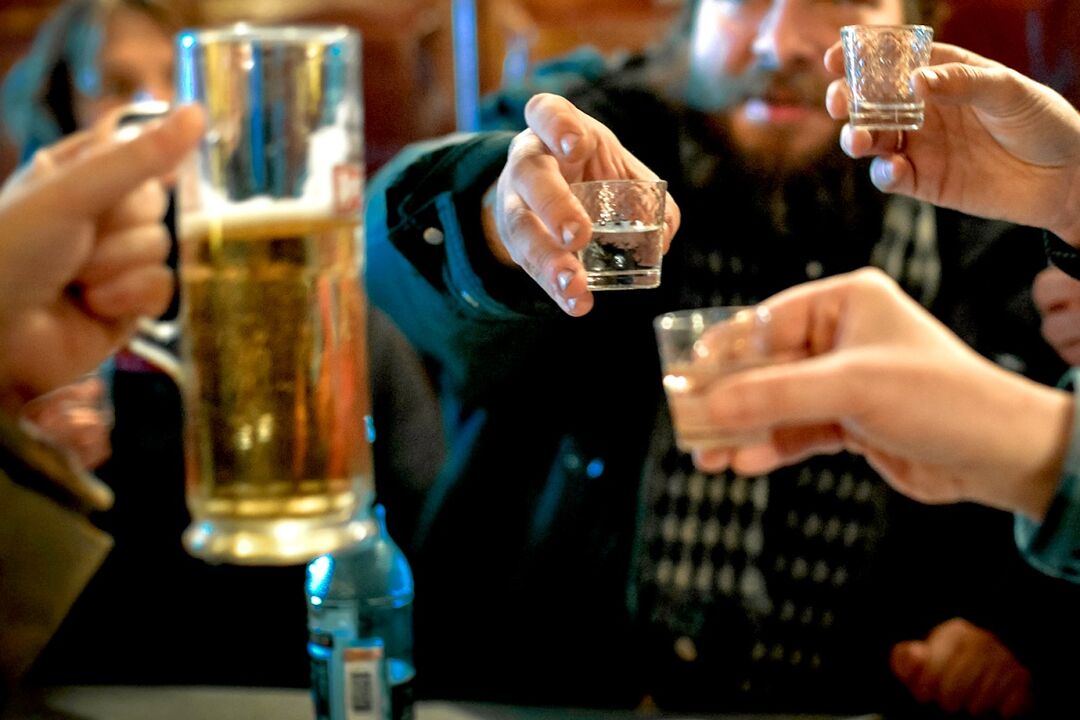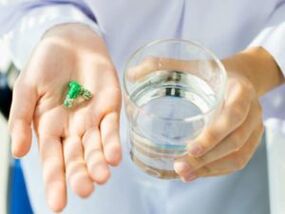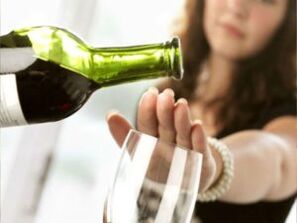
Alcohol in general has a strong negative effect on the body. If you use it right after you finish your course of antibiotics, your risk of problems increases dramatically. Of course, in some cases the danger will be minimal, but some medications commonly prescribed for serious illnesses are incompatible with alcohol.
During treatment with antibiotics, doctors recommend limiting alcohol intake. Similar restrictions are described in the instructions for use of each antimicrobial agent. If you drink alcohol after taking antibiotics, the effects of the therapy may be weakened or minimized. Perhaps the development of adverse reactions and complications.
How long to wait after antibiotic treatment before drinking wine, vodka or even beer? Read more about this.
Antibiotics - what is this medicine?
There are several main types of antibiotics. The simplest varieties are made with organic ingredients, others are purely synthetic, and others are some sort of intermediate selection. Regardless of the group, all drugs help to slow down the growth of pathogenic microflora, prevent and destroy them.
The drugs mentioned can only be used for infections of a bacterial nature - they have absolutely no effect on viruses (even the flu).
Antibiotics are available in various forms:
- capsules;
- medicine;
- ointment;
- liquid for injection;
- syrup.
Regardless of this, the drugs work the same way. Moreover, even when reaching external means, the main substance still penetrates into the bloodstream.
Can I drink alcohol after completing a course of antibiotics?
When a person falls ill, the main task of the doctors is to ensure the person's ability to recover quickly. For this purpose, in addition to medication, the following may be prescribed:
- diets;
- physical therapy;
- various additional procedures.
At the same time, the physician is obligated to minimize the impact of any negative factors that may delay treatment, reduce effectiveness, or cause complications. It is for this purpose that experts recommend limiting alcohol intake.
Any disease itself is a burden on the immune system. Furthermore, many antibacterial drugs do not work very well on internal organs. For this reason, their dosage and duration of use are determined as precisely as possible. Alcohol, taken, has a negative effect on the liver and kidneys of a perfectly healthy person. Accordingly, together with pathogens and antibiotics, it extremely overloads the mentioned organs and increases intoxication.
Even when the course is completed, it is not advisable to rush to catch up - doctors advise to wait a certain time. So in the accept case:
- it is allowed to take the usual antibiotics after at least 3 days (preferably 5 days);
- long-acting drugs - you need to wait at least 3 weeks.
What antibiotic cannot be combined with alcohol?
There are quite a few drugs, in the process of taking absolutely do not drink alcohol.
Therefore, nitroimidazoles are incompatible with alcohol. Their combination with ethanol causes a disulfiram-like reaction, an acute intoxication used to code people who want to stop drinking.
In this situation, it is better to start drinking alcoholic beverages at least two days after the end of the course.
The next group is fluoroquinolones. Here alcohol is allowed after 3 days. The drug already has a strong effect on the central nervous system, and together with alcohol can lead to the development of serious side effects (the worst of which is coma).
People taking cephalosporins should give up drinking alcohol during their cycle. Need to wait at least one day after completion. If there are any kidney pathologies, then it is possible to rest no earlier than 3 days.
Taking tetracyclines is very painful for the liver. These drugs are eliminated from the body for a long time. Drinking alcohol is better to postpone 4 days.
Aminoglycosides are another rather toxic class of antibiotics. They are harmful to both the kidneys and the liver. After treatment with these medicines, you cannot drink alcohol for about 15 days.
Lincosamides (even if they are taken according to a system developed by your doctor) have negative effects on the liver and central nervous system. They can cause disulfiram-like reactions. Drink alcohol no earlier than after 4 days.
All macrolides increase the risk of developing cirrhosis. They are eliminated from the body in an inefficient manner. How long do you need to wait? The recommended abstinence period is 5 days.
Antibiotics that help get rid of TB are usually taken for a long time. They have a side effect - drug-induced reactive hepatitis. When it comes to such drugs, alcohol is only drunk by suicides.
How long can antibiotics last after finishing the course?
Scientists have determined how many specific antibiotic metabolites remain active in the body. If we are talking about simple drugs, then the interval is 3 days. In the case of prolonged - from 2 weeks or more.
Several other factors also influence how long to abstain from alcohol:
- course duration;
- compatibility of the drug with ethanol;
- the presence of direct contraindications.
It is not possible to independently determine how long to wait before drinking alcohol. For this reason, it is better to seek comprehensive advice from your doctor.
What happens if you take antibiotics with alcohol?

Alcohol while taking antibiotics can cause a lot of unwanted complications. First of all, ethanol is guaranteed to weaken the effectiveness of the drug, leading to the development of resistance in the pathogenic strain.
It is impossible not to mention the possibility of the disease turning into a chronic form. Even because of a small amount of alcohol, the antibiotic is absorbed more quickly and does not reach the infected area.
Alcohol with the drug in question often stimulates blood clotting and as a result, this leads to heart attacks or strokes. At best, existing diseases of the cardiovascular system will worsen.
When you drink alcohol, the concentration of antibiotics will decrease. Doctors have to increase the dose of the drug later, increasing the burden on the kidneys and liver. Nor must we forget about the negative effects of ethanol itself on these organs.
There is also the added risk of allergies. In simple cases, the patient will develop a red and itchy rash, in complicated cases may develop Quincke edema or even anaphylaxis.
When can you drink alcohol immediately after taking antibiotics?
There are a number of drugs that are allowed to use ethanol. The foregoing cannot be considered to permit direct ingestion of tablets with alcohol. It is necessary to wait at least 3-6 hours, but it is more correct to give up breastfeeding until the treatment is complete.
These relatively safe medications include:
- penicillin and its derivatives;
- some glycopeptides;
- ansamycins and others.
Remember, if you must take any of the antibiotics mentioned above, don't forget about the possibility of an individual reaction to their combination with alcohol.
Admission Rules
Antibiotics must be taken correctly - only in this case will they have the proper effect. So specifically:
- drugs prescribed by a doctor;
- he also determines how much it should be consumed and in what dosage;
- The drug is washed down with a cool and sugar-free drink (preferably water);
- during treatment, you should follow a diet (forbidden fat, focus on protein foods and long carbohydrates);
- while taking antibiotics, drink plenty of water;
- even if symptoms disappear, continue treatment for a time determined by your doctor.
Can I drink alcohol while taking antibiotics?
In fact, many people do not know whether it is allowed to combine alcohol and antibiotics. Some people are sure that drinking alcohol is not dangerous if you do it a few hours after taking the drug. Others believe that they should not be mixed under any circumstances. In fact, the truth lies somewhere - it all depends on the general condition of the patient and the type of drug prescribed for him. What effect does alcohol have on the body if taken with antibiotics? We will talk about this further.
How does alcohol interact with antibiotics?
Only a naive person would ask a doctor what antibiotics can be combined with alcohol. They will certainly say that taking them in parallel is definitely a big mistake. In fact, they are right, because for them the main task is to put a person at his feet as quickly as possible.

Why can't you take antibiotics and drink alcohol at the same time? Doctors note that after taking antibacterial drugs (orally only), their breakdown products are used by the liver. This organ is generally the main filter that removes toxins, i. e. it also cleans the blood from substances present in the blood caused by drinking alcohol. If you combine alcohol and drugs, then the load will increase by about half - this leads to faster liver wear.
Also, when taking antibiotics, remember to drink plenty of water, this allows you to speed up the healing process. The same is true in the treatment of drunkenness. Excess moisture will increase the load on the kidneys, which is also not good.
At the same time, alcohol in some way changes the intensity and quality of metabolism. It is impossible to predict what its impact will be here. If a person mixes drugs and ethanol, the result can be that the person is acting too weak or too strong.
At the same time, there are antibiotics that, when entering the human body, will bind with alcohol, leading to worse effects on the central nervous system and gastrointestinal tract.
So, if you take the drugs mentioned, it is necessary to find out how they interact with spirits and whether it is permissible to combine them in principle.
Why You Shouldn't Drink Alcohol
If things are more or less clear with strong alcohol, then certain difficulties arise with weak alcohol. Many patients are sure that you can drink the last cup even while on antibiotics, believing that the extent of negative effects depends solely on the strength of the alcohol.
In fact, this is an illusion. Both vodka and wine contain ethyl alcohol, which acts in both cases in the same way. Furthermore, the tolerances of light drinkers are often greater than those of strong drinkers, so we all have an increased load on the liver and kidneys.
The combination of weak alcohol with antibiotics is also dangerous for others, because this alcohol contains many additional ingredients:
- yeast residue;
- dye;
- sweeteners;
- aromatic compounds;
- preservative;
- carbon dioxide, etc. v.
All of these increase the risk of unwanted side effects.
Taking antibiotics with alcohol - possible consequences
The main consequence that threatens those who take both antibiotics and alcohol is intoxication. The severity of the latter can vary. In general, healthy people usually have mild symptoms, while people with chronic diseases often have the opposite symptoms. In any case, poisoning is accompanied by:
- nausea;
- dizzy;
- loss of coordination;
- vomiting;
- diarrhea
- migraine headache;
- hyperthermia;
- convulsions;
- fainting.
In a serious situation, a person must be hospitalized urgently.
It is certainly impossible to avoid unpleasant consequences if combined with alcohol:
- Tetracyclines and almost all drugs of this series;
- Cephalosporins;
- Nitroimidazoles.
These antibiotics interact quite positively with ethanol, even when they are not interfered with, but are administered at intervals of 6 or 8 hours. As a result, a reaction with the same name as disulfiram begins in the body. Simply put, it is a sign of severe intoxication.
Under normal circumstances, this effect helps to encode alcohol withdrawal, but here the process is controlled by the condition researchers, and if the health condition worsens excessively, the patient should be fine. determined immediately by medication. At home, full support is not possible - that is why alcohol should not be mixed with the mentioned drugs.
These drugs must not be combined with any other chemicals at all. Ethanol should not be mixed with antibacterial drugs that help fight tuberculosis and leprosy.
Never drink alcohol if your doctor has prescribed a sulfonamide.
Antibiotics conditionally compatible with alcohol

What drugs can be combined with alcoholic beverages? It all depends on their inherent pharmacodynamics.
This is due to factors such as the half-life of the drug and the retention time of its metabolites in the body. If these indicators do not change significantly with alcohol consumption, you can take antibiotics but should not give up alcohol.
Take ethanol in small amounts without fear when it comes to penicillin-related drugs.
How much is allowed to drink? If we are talking about vodka, then the dosage is about 50 ml. Dry wine is allowed no more than 150 ml, and desserts - 100.
Antibiotics that are not mixed with alcohol are shown in the table:
| Coporation, group | Effect |
|---|---|
| Lincomycins | CNS damage |
| Macrolides | Strong negative effects on the liver |
The effects shown in the table commonly occur with long-term treatment with the drug, even in individuals who do not drink alcohol at all. Furthermore, in the absence of negative manifestations (this is generally normal in healthy individuals), the use of any of the stated antibiotics is not a contraindication. At the same time, it should be remembered that the drugs listed in the table should not be mixed with alcohol if you want to recover faster.
Alcohol is allowed to drink after how many days without special limit
So, you have stopped taking antibiotics and are wondering after what period of time can you take them without fear? The main excretion of most drugs is completed after one day (18-24 hours). At the end of this period, in principle, there is no danger to life. Antibiotics are completely eliminated from the body after 14 days. That is, in the absence of other contraindications, it is possible to try to catch up after 2 weeks.
Another very important question is how long should you abstain before taking antibacterial drugs? When the disease is not acute, it is recommended to wait 4 days, in urgent cases, one day is enough.
If we are talking about antibiotics of the tetracycline group, then the patient must wait at least 72 hours.

































